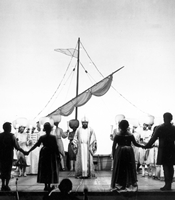
27 Jul 2008
MOZART: Die Entführung aus dem Serail — Salzburg 1975
Die Entführung aus dem Serail: Singspiel in 3 Acts.
Idomeneo, rè di Creta: Dramma per musica in tre atti (K. 366).
Idomeneo, rè di Creta: Dramma per musica in tre atti (K. 366).
Così fan tutte, ossia La scuola degli amanti (K. 588). Opera buffa in two acts.
Così fan tutte, ossia La scuola degli amanti (K. 588). Opera buffa in two acts.
Die Zauberflöte: Singspiel in two acts, K. 620
Die Zauberflöte: Singspiel in two acts, K. 620
La Clemenza di Tito: Opera seria in two acts, K621.
La Clemenza di Tito: Opera seria in two acts, K621.
Le Nozze di Figaro (The Marriage of Figaro): Opera buffa in four acts, K492
Le Nozze di Figaro (The Marriage of Figaro): Opera buffa in four acts, K492
Il dissoluto punito ossia il Don Giovanni (K. 527): Drama giocoso in two acts
Il dissoluto punito ossia il Don Giovanni (K. 527): Dramma giocoso in two acts
Chérubin: Comédie chantée in three acts.
Marie-Magdeleine: Drame sacré in three acts and four scenes
Le Cid: opéra in four acts and ten tableaux.
Esclarmonde: Opéra romanesque in four acts and eight tableaux.
Manon: Opéra comique in 5 acts and 6 tableaux
Thaïs: Comédie lyrique in three acts and seven scenes.
Fetonte: Dramma per musica in three acts.
La Partenope: Dramma per musica in three acts.

Die Entführung aus dem Serail: Singspiel in 3 Acts.
Streaming Audio
First Performance: 16 July 1782, Burgtheater, Vienna.
| Principal Characters: | |
| Selim, Pasha | Nonsinging role |
| Constanze, a Spanish lady and Belmonte's bethrothed | Soprano |
| Blonde, Constanze's English maid | Soprano |
| Belmonte, a Spanish nobleman | Tenor |
| Pedrillo, Belmonte's servant and now supervisor of the Pasha's gardens | Tenor |
| Osmin, overseer of the Pasha's country palace | Bass |
| Klaas, a sailor | Nonsinging role |
| Mute, Osmin's servant | Nonsinging role |
Setting: The country palace of Pasha Selim.
Synopsis:
Background to the story
This is the tale of Constanze and Belmonte, two young Spaniards of noble birth. Constanze, her English maid, Blonde, and Pedrillo, Belmonte’s servant, fell into the hands of pirates who attacked their ship. The pirates sold their captives at a slave market to Pasha Selim. After month of searching for them in despair, tormented by not knowing what had become of his beloved Constanze and the two servants, Belmonte sets out to find them.
Act One
Belmonte has arrived on the distant Turkish shore and approaches the high wall surrounding the seraglio. Here he encounters Osmin, the Pasha’s right-hand man, and questions him about the people he is seeking. Osmin, however, has not the slightest intention of giving this stranger any information whatsoever and sends him on his way.
Belmonte continues to look for a way to get into the seraglio.Through a prison window, he manages to catch a glimpse of Pedrillo. This confirms that Constanze and Blonde are also being held prisoner in the harem.
Pasha Selim has chosen Constanze to be the object of his affections. He visits the harem every day and does everything in his power to persuade her into accepting his suit. Constanze remains steadfast in adamantly refusing to succumb. She has no idea yet that her beloved Belmonte is so near.
Meanwhile, Belmonte has disguised himself as an architect an enters the First Courtyard of the seraglio. He teams up with Pedrillo and together they try to get past Osmin into the Second Courtyard.
Act Two
Osmin has taken a fancy to Blonde, but his persistent advances are met with resistance by the young English woman. The two of them are involved in constant battles of wit, which Osmin just can’t win.
Constanze makes it increasingly difficult for the Pasha to approach her and he finally loses patience. He threatens to punish her if she does not soon accept his suit.
Blonde learns about the plan for their escape from Pedrillo. Before they can put the plan into action, however, they first have to outwit Osmin. Pedrillo manages to persuade Osmin to help him empty a bottle of wine and the latter then falls into a deep sleep. The two couples are able to meet and plan their escape.
Act Three
Belmonte, still disguised as an architect, smuggles Pedrillo out of the Seraglio and they head for Belmonte’s ship. There they wait for night to fall.
Music composed by Wolfgang Amadeus Mozart (1756–1791). Libretto by Johann Gottlieb Stephanie the Younger, based on an earlier libretto by Christoph Friedrich Bretzner.
At midnight, Belmonte and Pedrillo row round the coast to the foot of the harem. Pedrillo serenades his Blonde as a signal. Osmin discovers them in the boat and sends a fleet of ships out to capture them again.
The death penalty awaits them, but Pasha Selim decides to forgo revenge and sets the captives free.
[Synopsis Source: Bayerische Staatsoper]